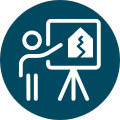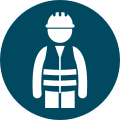
Our vision:
A safe and healthy Kitsap County for all.
Wildfire Smoke
Air pollution, including smoke from wildfires, is bad for everyone's health.
Wildfire smoke is a growing health concern in the Pacific Northwest as hotter, drier summers increase risk for wildfires. See our climate page for more information.
You can protect yourself by checking air quality and staying indoors as much as possible when air quality is poor. Get help right away if you are experiencing difficulty breathing or heart problems.

Click here to view current air quality if graphic does not load.
Checking Air Quality
For current air quality conditions in Kitsap County, go to:
For updates on wildfire activity and smoke forecasts, visit the Washington Smoke Information blog
Health Hazards
For information on how to stay safe and healthy during some of the most likely hazards we see or will likely experience in Kitsap County, check out the links below.
Visit the Kitsap County Department of Emergency Management website to learn more about local disaster preparedness and sign up for alerts. More resources are available at Ready.gov.
Smoke and your health
Smoke is bad for everyone's health. Tiny particles from wood smoke can get into your lungs and bloodstream and cause serious health problems.
Some people are at higher risk of serious health problems from smoke, including:
Babies and children
Older adults (65 and older)
People who are pregnant
People who are unhoused
People who work or exercise outdoors
People with health conditions, such as heart or breathing problems
How to protect your health
Your risk from wildfire smoke and other air pollution varies depending on how much pollution is in the air and what personal risk factors you have.
In general, you can protect your health when air quality is poor by:
Staying indoors as much as possible.
Avoiding vigorous outdoor activities such as running or biking.
Keeping air in your home as clean as possible:
Keep windows and doors closed as much as possible.
Use an air cleaner with HEPA filter if available.
Use fans or an air conditioner to cool your home. Set AC to recirculate.
Avoid activities that create dust or smoke, such as frying foods or vacuuming.
Wearing masks
If you have to be outside, consider wearing a high-quality respirator (mask) such as an N95 or KN95. Make sure the mask fits snugly over your mouth and nose. Loose-fitting masks, surgical masks, and cloth face coverings will not filter out smoke particles.
How to make a clean air filter
You can make an air cleaner for your home using a box fan and an HVAC filter.
You can also watch in Español (Spanish) and Tiếng Việt (Vietnamese).
Get help if you need it
Community resources are available if you need help staying safe during bad air quality days.
Contact a healthcare provider if you are concerned about symptoms related to air quality. Get medical help right away if you have severe symptoms, such as trouble breathing or heart problems.
If you do not have a safe place to stay indoors, go to a public indoor space with cleaner air or air conditioning, such as a library, mall, or community center.
Cleaner air or cooling shelters may be opened in Kitsap County when unhealthy air quality or extreme heat is expected. For more information, call 211 or visit the Kitsap County Department of Emergency Management website.
More resources
Cooling Centers & Severe Weather Shelters | Kitsap County DEM
Life Support Medical Needs & Public Safety Power Shut Off | PSE
Wildfire Smoke | Washington State Dept. of Health
Wildfire Smoke Safety | Washington State L&I
Data: Air Quality & Asthma Visits to Kitsap Emergency Departments

Data: Heat Extremes in Kitsap County

Data: Precipitation in Kitsap County

Data: Temperature & Heat-related Visits to Emergency Departments

Data: Temperature and Cold-related Visits to Kitsap Emergency Departments











.png)
